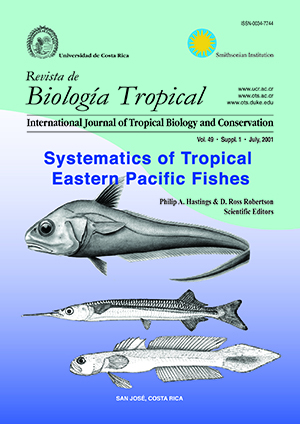Abstract
Symphurus diabolicus, previously known only from the holotype collected in 501 m west of Isla San Cristobal (Chatham Island), Galápagos Archipelago, is re-described based on the holotype (112.6 mm SL) and 19 additional specimens (61.1-123.5 mm SL) recently collected from deep waters around the Galápagos Archipelago. Symphurus diabolicus is characterized by: an elongate body; narrow head with pointed snout; 1-3-2 ID pattern; 106-110 dorsal-fin rays; 89-96 anal-fin rays; 12 caudal-fin rays; 57-59 total vertebrae; 5 hypurals; extremely small scales; no pupillary operculum; large, prominent eyes, with migrated eye near dorsal margin of head; relatively short postorbital head length; relatively long snout and predorsal lengths; black peritoneum visible through abdominal wall on both sides of body; uniform olive green to dark brown ocular-side coloration with series of prominent, darker brown, elliptical to rectangular, blotches (not usually forming crossbands) along body at bases of dorsal and anal fins; and uniformly whitish or light yellow blind side. Symphurus diabolicus appears to be endemic to the Galápagos Archipelago, and is relatively common (captured at 16 different localities) at depths of 308 to 757 m (observed as shallow as 245 m) in this region. Examination of this expanded series of specimens confirms the validity of S. diabolicus and provides characters to distinguish it from S. microlepis Garman, a similar species known only from the holotype taken at approximately 530 m off Pacific Panama.References
Garman, S. 1899. The fishes. Reports on an exploration off the west coasts of Mexico, Central and South America, and off the Galápagos Islands, in charge of Alexander Agassiz, by the U.S. Fish Commission Steamer “Albatross”, during 1891, Lieut. Commander Z.L. Tanner, U.S.N., commanding. Mem. Mus. Comp. Zool., Harvard 24:1-431.
Grove, J.S., & R.J. Lavenberg. 1997. The fishes of the Galapagos Islands. Stanford University Press, Stanford, California. 863 p.
Leviton, A.E., R.H. Gibbs, Jr., E. Heal & C.E. Dawson. 1985. Standards in herpetology and ichthyology: Part I. Standard symbolic codes for institutional resource collections in herpetology and ichthyology. Copeia 1985:802-832.
Mahadeva, M.N. & T.A. Munroe. 1990. Three new species of symphurine tonguefishes from tropical and warm temperate waters of the eastern Pacific (Symphurus: Cynoglossidae: Pleuronectiformes). Proc. Biol. Soc. Wash. 103:931-954.
Munroe, T.A. 1990. Eastern Atlantic tonguefishes (Sym - phurus: Cynoglossidae, Pleuronectiformes), with descriptions of two new species. Bull. Mar. Sci. 47:464-515.
Munroe, T.A. 1992. Interdigitation pattern of dorsal-fin pterygiophores and neural spines, an important diagnostic character for symphurine tonguefishes (Symphurus: Cynoglossidae: Pleuronectiformes). Bull. Mar. Sci. 50:357-403.
Munroe, T.A. 1998. Systematics and ecology of tonguefishes of the genus Symphurus (Cynoglossidae: Pleuronectiformes) from the western Atlantic Ocean. Fish. Bull. 96:1-182.
oe, T.A., F. Krupp, & M. Schneider. 1997. Cynoglossidae, p. 1039-1059. In: W. Fischer, F. Krupp, W. Schneider, C. Sommer, K.E. Carpenter, and V.H. Niem. Guía FAO para la identificación de especies para los fines de la pesca. Pacifico centro-oriental. Vol. II: 647-1200.
Woram, J.M. 1989. Galápagos island names. Noticias de Galápagos, no. 48. Pp. 22-32.
Comments

This work is licensed under a Creative Commons Attribution 4.0 International License.
Copyright (c) 2001 Revista de Biología Tropical


